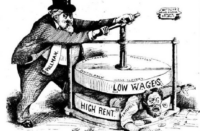“The purpose of our meeting today is precisely to ensure that literature and art fit well into the whole revolutionary machine as a component part, that they operate as powerful weapons for uniting and educating the people and for attacking and destroying the enemy, and that they help the people fight the enemy with one heart and one mind.”—Mao Zedong.
The point of this article is to start a discussion, to act as a jumping-off point, rather than to provide any definitive answers. What would “left-wing” mass media look like? Many ideas have been proposed in Ireland in recent years. In his “Talks at the Yenan Forum on Literature and Art” (Selected Works of Mao Zedong) in May 1942, Mao posed two main questions in attempting to answer this: Who are artists and writers dealing with? and How do writers and artists serve them?
In answering the first question, Mao looked at three groups: “the enemy, our allies in the united front, and our own people; the last are the masses and their vanguard.” Mao argued that a different approach was needed for each group: the enemy needed to have their duplicity and cruelty and the “inevitability of their defeat” pointed out; allies need both support and criticism; while all work should provide education and boost morale in the workers’ class.
Lenin puts this idea succinctly in “Party organisation and party literature” when he says that art should “serve . . . the millions and tens of millions of working people.”
The second question, How do we serve our class? is the thornier issue and the one that requires some debate. Mao hits the heart of this debate when he asks, “Should we devote ourselves to raising standards, or should we devote ourselves to popularisation?”
He provides quite a dialectical answer to this question: the answer, of course, is both. We must provide direction to our class, but we must also learn from our class. To paraphrase Lenin in What Is to Be Done? we must go to where our class is.
This provides a good template with which to analyse the modern media. With issues regarding Facebook’s increasing censorship of left-wing pages and platforms, it can be tempting to abandon social media or to grow defeatist. But this impulse must be resisted: the social media are where our class are, and, to quote Lenin again, we must “go among all classes of the population,” as theoreticians, as propagandists, as agitators, and as organisers.
There is a constant tendency to defeatism on some aspects of the left. With the rise of the “alt-right” on line and the success of vulgar reactionaries, there are often calls such as “Why are there no left mass media in the on-line world?” But to ask such a question is to ignore the material realities that privilege such messages over ones that would necessarily bring our class into conflict with those who control the information sources.
We need to do more than just ape the style and vernacular of the right. Such a thing would not provide the revolutionary sustenance necessary for our class. We must instead create a new, revolutionary aesthetic by which to share our educational message—in a way that is accessible to our class.
The reason the “form” common to right-wing media works for a right-wing message is that those two things are sympathetic. We must create our own. If we ignore the forces of the ideological state apparatus or hegemony we fall into the trap that the right is setting for us: failing to provide the necessary analysis to our class. Remember that every media organisation, old or new, has a class character.
But this is no modern phenomenon. Mao wrote of the revanchist media in 1942: “Reactionaries have money, and though they can produce nothing good, they can go all out and produce in quantity.” With the advent of the internet, I don’t believe there has ever been a period in history when it was easier to gain access to Marxist analysis, nor has there ever been such a volume of it.
What may be missing, though, is a form of media that does what Mao said was necessary: simultaneously uplifts and popularises. Many of the left media on line do one or the other. We see great works of analysis that wither and die on obscure blogs, and similarly we see podcasts that earn millions of dollars a year but parrot the most superficial “horse-race” analysis of political talking heads.
We need to provide more than “This is good because it is socialist” or “This is bad because it is neo-liberal.” We need to provide an education in the Marxist-Leninist mode of thinking, so that the workers’ class can decide for themselves if something is good, or indeed if it is “socialist.”
The second issue is that the message of Marxism-Leninism is, by its nature, less passive than the right wing. We cannot tell people to concentrate on self-improvement, to read more books and the world will be a better place by magic. To become active in the party, in the trade unions, to educate yourself on economics and social theory—those are the demands of Marxism-Leninism, and this will always be a harder sell than “twelve happy thoughts to get you through the day.”
But these things are surmountable, as they have been in the past. What it requires is a level of ingenuity and communication that will bring the works of Marx, Lenin and Connolly alive in a 21st-century context. But that means using every tool at our disposal, and social media are a very large part of it.
Lenin, again in “Party organisation and party literature,” described the ideal characteristics of literature as “a free literature, because the idea of socialism and sympathy with the working people, and not greed or careerism, will bring ever new forces to its ranks. It will be a free literature, because it will serve not some satiated heroine, not the bored ‘upper ten thousand’ suffering from fatty degeneration, but the millions and tens of millions of working people—the flower of the country, its strength and its future.
“It will be a free literature, enriching the last word in the revolutionary thought of mankind with the experience and living work of the socialist proletariat, bringing about permanent interaction between the experience of the past (scientific socialism, the completion of the development of socialism from its primitive, utopian forms) and the experience of the present (the present struggle of the worker comrades).”
That should be the aspiration.






